
Hello Professor @pelon53, I'm grateful for the opportunity to learn from you. This week's lesson on wrapped tokens was very educative and interesting. I had always thought about why wrapped tokens existed but didn't make an attempt to research. I also knew certain tokens weren't compatible with other blockchains, but thanks to your lecture I have a clearer understanding of the usage of tokens on different blockchains.
If you have tried depositing a token that is used within different Blockchains like BTC, TRX or ETH on Binance before, you'd notice the type of network is asked. The image below shows what happens when you click deposit when you want to deposit a token.
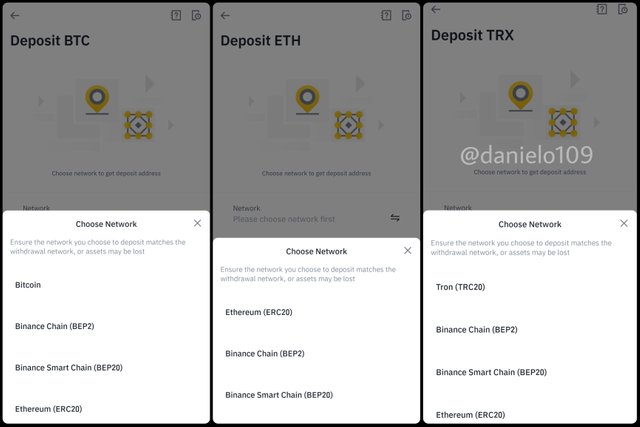
This pop-up is necessary to prevent your funds from being lost. This is because of the incompatibility of certain tokens on other blockchains. Tokens have different versions due to wrapping to be used on different blockchains. These wrapped tokens of a token have the same value as that token but are only compatible with certain blockchains. They can also be reversed to the original token when needed.

1.- Name at least 2 Blockchains that use Wrapped BTC, excluding Ethereum, and show screenshots. Explain.
Blockchains that use Wrapped BTC

Binance Chain and Binance Smart Chain (BSC)
Binance Bridge is a project on the Binance Chain and Binance Smart Chain. The Binance Bridge project serves as a bridge to the usage of tokens from other Blockchains on Binance Chain/BSC. It aims to increase the interoperability between blockchains. It allows users to convert tokens to wrapped tokens and back to the original at zero charges.
Several tokens are supported by the Binance Bridge. Examples include BTC, ETH, USDT, LTC, XRP, TRX and others. The tokens are converted to BEP-2 or BEP-20 tokens when wrapped and can be used within the BSC.
How Binance Bridge works
You can visit Binance bridge with this link. When you visit the page you can figure out how simple it is to work with Binance Bridge when you want to convert a token. Binance Bridge gives you quite a number of options for the conversion of tokens. There are many assets you can choose to convert to BSC and Binance Chain Network.
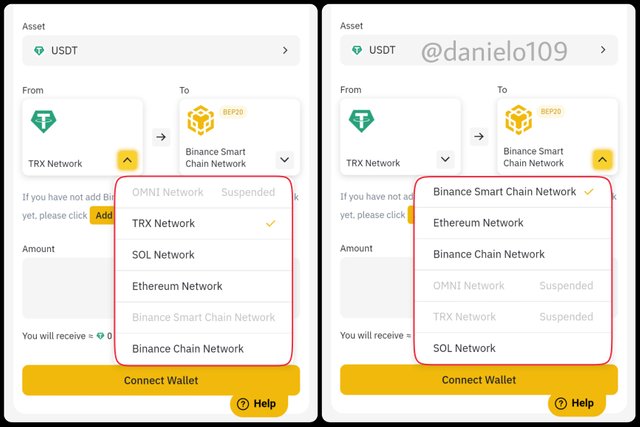
It is also possible to convert tokens to other networks aside from BSC and Binance Chain. From the image above you can see that the USDT from the TRX Network can be converted to the SOL and Ethereum Network also. Some of these other networks you can make conversions to are suspended but the BSC and Binance chain Networks are available for all the assets listed.
The conversions of tokens are in two forms, these are Peg-in and Peg-out. Peg-in is the type of conversion that converts the native token into a wrapped BSC/Binance Chain token while Peg-out is the process used to unwrap a token, thus converting from a wrapped BSC/Binance Chain token into its native token.
To carry out a conversion, you need either a Metamask wallet or a Binance Chain wallet. On your Metamask wallet, you have to make sure you have added the BSC network also.
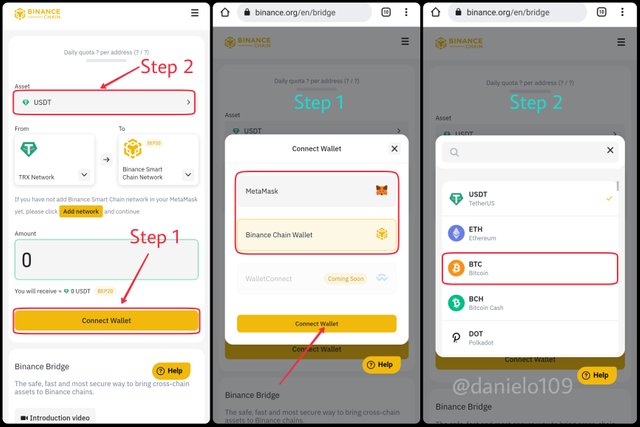
If you want to Peg-in BTC, you'd first have to click on asset and select BTC. Select the network of the BTC you want to Peg-in and then enter the amount.
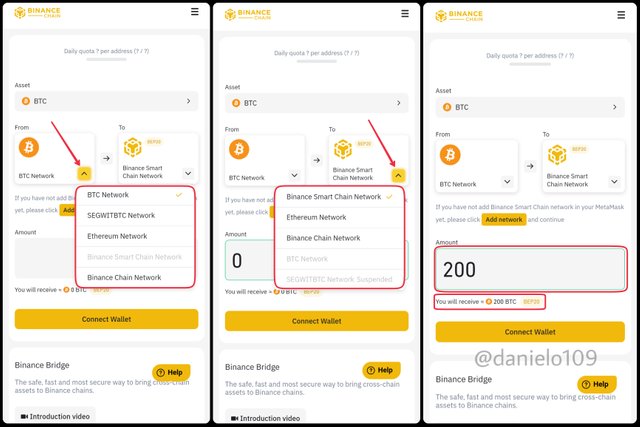
Select the network of the BTC you want to Peg-in and the network you want to convert to. Enter the amount next. From the image above you can see that converting 200 BTC from the BTC network to the BSC network would give you 200 BTC BEP2.
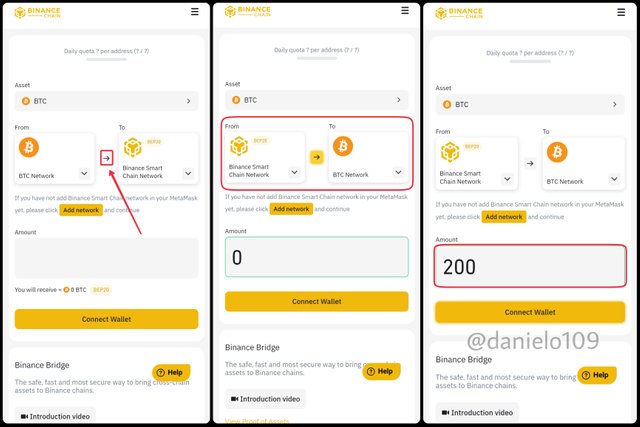
If you want to Peg-out, you click on the arrow pointing right and perform the same process.
You can check out the video above for a detailed explanation.
Binance Bridge gives proof of assets. This gives credibility to the converted tokens. You can visit this link to view the proof of assets.
Tron Blockchain
Wrapped BTC is available on the Tron network to allow users to make use of their BTC tokens within the Tron ecosystem. The name of this token is BTCTRON (BTCT) and it has the same value as BTC. BTCTRON (There is another wrapped BTC token created by BitGo together with Republic Protocol and Kyber Network to allow users to make use of their BTC on other blockchain networks like Ethereum and Tron that have many Dapps. The name of this token is WBTC.

The process of obtaining a Wrapped BTC token
The BitGo company allows users to lock up their BTC in a safe vault and then they receive WBTC in exchange. Users are allowed to convert their tokens back to the original anytime. The address of the WBTC token is
TXpw8XeWYeTUd4quDskoUqeQPowRh4jY65.
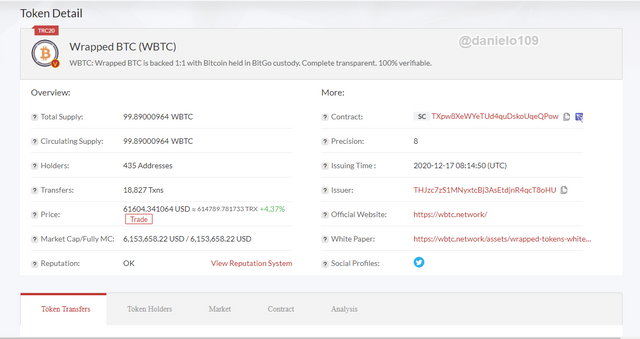
This is the contract address for BTCTRON (BTCT):
TN3W4H6rK2ce4vX9YnFQHwKENnHjoxb3m9. You can swap your BTC for wrapped BTC (BTCTRON) on Poloniex for free using this link.
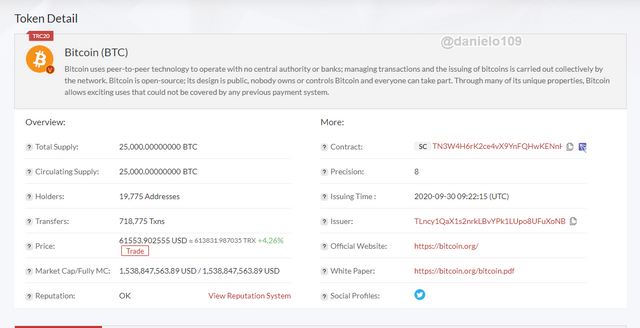
Both wrapped BTC's can be added to the TronLink pro wallet and swapped for other tokens or vice versa.

2.- What is the difference between the wETH of the Ethereum platform and the wETH of the TRON platform? Explain.
Difference Between the wETH of the Ethereum and TRON platform

TRC-20 tokens and ERC-20 tokens are compatible with the Ethereum Blockchain. The wrapped ETH token on the Tron and Ethereum network are TRC-20 and ERC-20 tokens respectively. It is understandable that there is wETH for the Tron network but one might wonder why there is a wrapped ETH for the Ethereum Blockchain.
The native token of the Ethereum blockchain is ETH, this token was created long before the implementation of the standard tokens of the Ethereum blockchain. After the implementation of the ERC token standards, the ETH token was incompatible with the ERC-20 standard token and so the developers decided to upgrade the ETH to ERC-20 through wrapping.
The difference between the wETH of the Tron and Ethereum blockchain is that first of all, they both function on different blockchain networks. The other difference is that the wETH of the Ethereum network conversion does not involve a third party unlike the wETH of the Tron Network that is facilitated by Bitgo. The conversion is done by the Ethereum blockchain itself to avoid unnecessary risks that could be incurred with transaction errors. With wETH on Ethereum, there is no burning of tokens when unwrapping is done. With the wETH on the Tron network, unwrapping leads to the burning of the wETH before the ETH is returned. Also so the wrapped ETH on the Ethereum blockchain is decentralised unlike the wETH on the Tron network because of the involvement of Bitgo.
In general, the ETH token needed wrapping in order to make it compatible with the ERC-20 token standards in order to easily exchange it for other ERC-20 tokens. The wETH token of the Tron network on the other hand is to allow users to utilise their ETH on the Tron Blockchain.

3.- Make an investment of at least $ 5 of a Wrapped token. Explain the process with screenshots. You can use the JustSwap platform.
Making an investment of a Wrapped token on JustSwap

For this task, I'd be using JustSwap to make a swap of 54 TRX for WBTT. At the time I was doing this homework 54 TRX was equivalent to $5.4. I would be using my TronLink Pro wallet application on android.
I already have an account and so I just click on swap which directs me to the instant swap menu of JustSwap. I selected the tokens I wanted to swap and entered the amount. After, I clicked on Instant Swap.
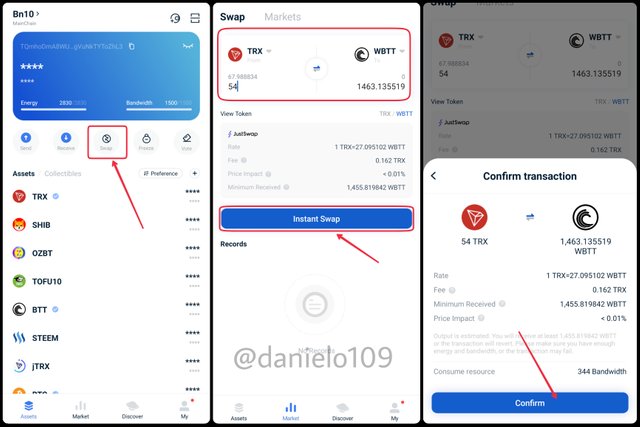
The transaction was submitted. After less than a minute the transaction was successful. To check the details of the transaction I clicked on the record. The image below shows the details of the transaction.
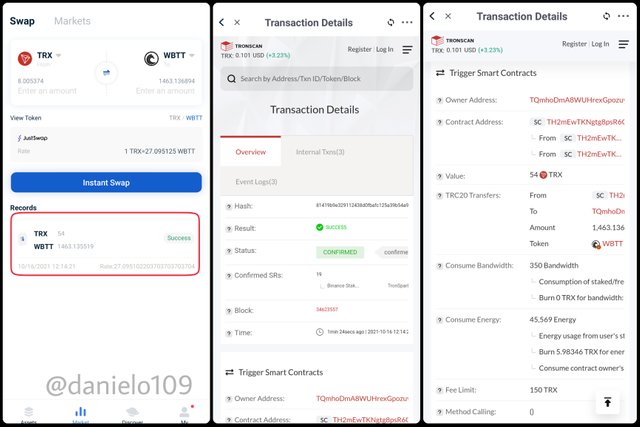

4.- Explain in detail the Wrapped token of the TRON Blockchain. Show screenshot.
The Wrapped token of the Tron Blockchain

The Tron blockchain network has a total of 5 listed wrapped tokens these include; BTCT, WBTC, WETH, WBTT and WTRX. These tokens were created for compatibility and easy usage of the tokens with the Tron Ecosystem. Among these tokens, two were created by the BitGo company, these are the wBTC and the wBTC. BTCT was created/baked by Bitcoin and the other two; wTRX and wBTT were created by the Tron Network.
wTRX
WTRX was the first wrapped token on the TRX blockchain.WTRX is a TRC-20 token created to make the native Tron token compatible with the TRC-20 tokens on the Tron blockchain network. This is similar to the wrapping of the native ETH token into wETH which is an ERC-20 token standard. This token was issued on the 3rd of April 2020. Below are the details of the token as at the time I was doing the homework.
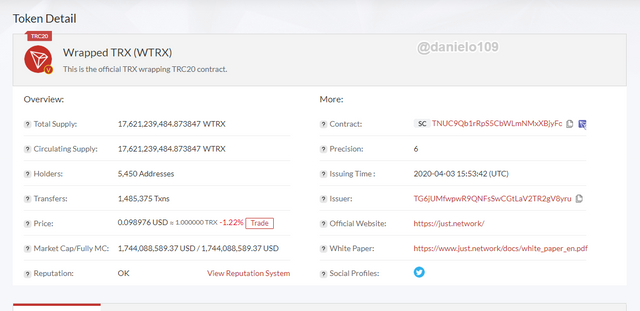
Price: 0.098976 USD
Total Supply: 17,621,239,484.873847 WTRX
Circulating Supply: 17,621,239,484.873847 WTRX
Holaders: 5,450 Addresses
Transfers: 1,485,375 Txns
Market Cap: 1,744,088,589.37 USD
Contract: TNUC9Qb1rRpS5CbWLmNMxXBjyFoydXjWFR
wBTT
BTT is a TRC-10 token built on the Tron network. After the implementation of the TRC token standards, an upgrade of the BTT was needed to be able to use BTT easily with other TRC-20 tokens on the blockchain network. This led to the creation of the TRC-20 wBTT token. This was issued on the 15th of September 2020. Below are the details of the wBTT token from Tronscan.
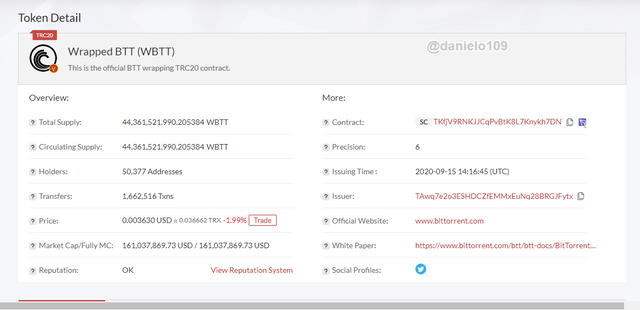
Price: 0.003622 USD
Total Supply: 44,361,521,990.205384WBTT
Circulating Supply: 44,361,521,990.205384WBTT
Holders: 5,0377 Addresses
Transfers: 1,662,516 Txns
Market Cap: 161,037,869.73
Contract: TKfjV9RNKJJCqPvBtK8L7Knykh7DNWvnYt
BTCTRON (BTCT)
BTCT was issued on the 30th of September 2020 by Bitcoin. It is a TRC-20 token that has its value pegged to the native BTC token which allows users to make use of their BTC economically on the TRX blockchain. The Details of the token can be seen below from Tronscan.
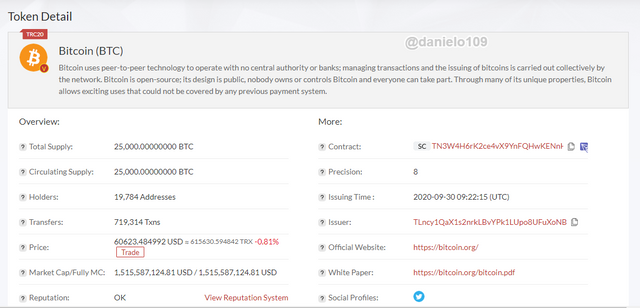
Price: 60623.484992 USD
Total Supply: 25,000.00000000BTC
Circulating Supply: 25,000.00000000BTC
Holders: 19,784 Addresses
Transfers: 719,314 Txns
Market Cap: 1,515,587,124.81 USD
Contract: TN3W4H6rK2ce4vX9YnFQHwKENnHjoxb3m9
wETH and wBTC
WETH and WBTC are both TRC-20 tokens issued by the BitGo company. These tokens were issued on the 17th of December 2020. Earlier I explained how the BitGo company locked up the native tokens and gave out the wrapped BTC for usage on other Blockchain networks. The native tokens of ETH and BTC are locked up and the users receive an equivalent amount of their BTC and ETH for usage on the Tron network. Below are the details of the wETH and wBTC from Tronscan.org.
Details of wETH
.png)
Price: 4666.471895 USD
Total Supply: 1,998.598800000000000000WETH
Circulating Supply: 1,998.598800000000000000WETH
Holaders: 301 Addresses
Transfers: 301 Txns
Market Cap: 9,326,405.13 USD
Contract: TXWkP3jLBqRGojUih1ShzNyDaN5Csnebok
Details of wBTC
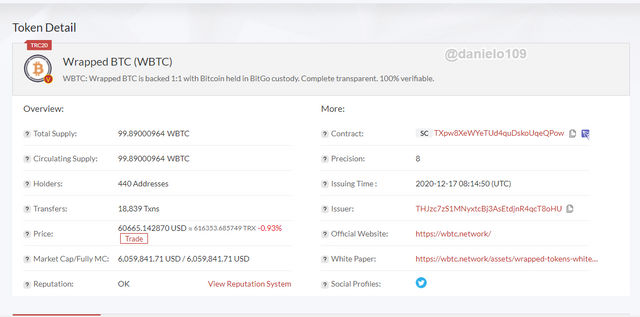
Price: 60665.142870 USD
Total Supply: 99.89000964WBTC
Circulating Supply: 99.89000964WBTC
Holders: 440 Addresses
Transfers: 18,839 Txns
Market Cap: 6,059,841.71 USD
Contract: TXpw8XeWYeTUd4quDskoUqeQPowRh4jY65

5.- What is to mint a Wrapped token? What is burning a Wrapped token? What is your function? Create an example explaining the process.
About Wrapped Tokens

What is minting a Wrapped Token?
Minting a wrapped token is simply receiving a wrapped token after locking your native token up with your custodian. This process allows the wrapped tokens to be created and added to the network while your native token is put away in a safe vault. This is done by sending the native token to the address of the custodian. After confirmation, the custodian generates the wrapped token and it is received by the user. The wrapped token has a value equivalent to its native token and can be converted back to the original token.
What is burning a Wrapped Token?
Burning a wrapped token is simply the total elimination of a wrapped token from a network. This is done to ensure the stability of the network and prevent an excess amount in the circulation of the token. This happens often when an asset is unwrapped to get its native token. The wrapped token is burnt and the native token is released. This maintains the value and credibility of the tokens and prevents it all from being a scam or way to produce excess tokens.
Function
The wrapped tokens main function is to ensure compatibility on Blockchain networks and allow exchanges with tokens from different blockchain networks thus, increasing the economic usage of tokens and not limiting their usage on just their main network.
Let's say I have ETH from the Ethereum blockchain network and I want to purchase wBTT with my ETH. First of all my ETH is an ERC-20 token and wBTT is a TRC-20 token. These two tokens are incompatible and are from different blockchains. To be able to use my ETH on the Tron blockchain to purchase the wBTT I first have to send my ETH to Bitgo and receive wETH which is a TRC-20 token. Now the compatibility issue has been solved and so I can easily make the exchange on JustSwap.
If after I'm done with the other things I want to do and I want my ETH back, I can swap the wBTT for wETH and send it to BitGo to receive my ETH ERC-20.

Conclusion

A wrapped token is a very important token needed to cross the bridge of incompatibility among Blockchain networks. It is also needed to ensure the compatibility of old tokens with new tokens when the protocols are changed. This can be seen with the wTRX, wBTT and wETH.
Wrapped tokens have created a bridge to blockchain networks. With wrapped tokens, it is possible to use tokens from different blockchain platforms easily other blockchain networks. It has eliminated the complexities involved with making tokens compatible for usage on blockchain networks and has allowed users to be able to easily access defi platforms on other networks they want to invest in.
Binance Bridge is a very good project for converting native tokens to wrapped tokens from different networks and vice versa. It is simple to use and very safe as they give proof of assets. You can also choose to wrap tokens through BitGo, they also provide security for the efficient use of the wrapped tokens.
I would like to thank @pelon53 for this interesting lecture, I really learnt a lot and I'm grateful for the opportunity.